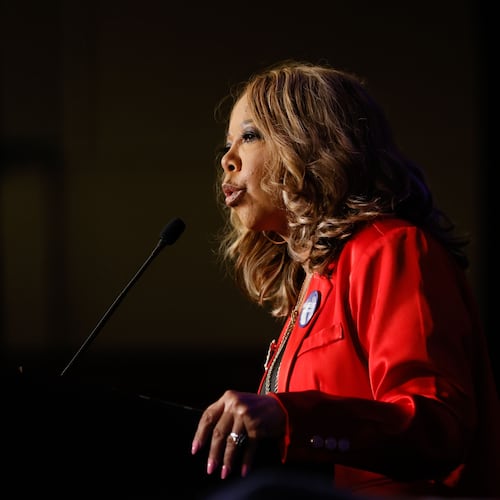The Rev. George Tatro had a vision: What if the Confederate monument that now stands in downtown Decatur, stirring up so much consternation, could be moved to the grounds of a church. What if it were one component in a permanent installation meant to facilitate conversations on social justice, to remind Americans of where we’ve been.
In the end, Tatro's congregation decided Memorial Drive Presbyterian Church in Stone Mountain, with only 100 members, didn't have the resources to take on the logical, financial and security responsibility.
But, while Tatro couldn’t provide a home, he did light the way.
The coalition of civil rights groups hoping to move the monument say the new vision has given them more focus and a bigger purpose as they continue reaching out to churches and other private groups to find the right location.
“What we have now is a much bigger and more cohesive idea of what this could be,” said Sara Patenaude, co-founder of Hate Free Decatur. “We think now we have an idea, a package and an interfaith community that is behind it.”
The monument was erected outside of what was then the DeKalb County Courthouse in 1908. It is a 30-foot-tall obelisk with an inscription at its base that praises Confederate soldiers because they "were of a covenant keeping race."
Last year, calls for the monument’s removal grew louder after white supremacists marched through Charlottesville, Va., to protest the removal of a Robert E. Lee statue. One counter-protesters was killed during the demonstration.
Hate Free Decatur formed shortly after and began petitioning elected officials to remove the monument from the center of town. Other groups joined in — the DeKalb NAACP, Beacon Hill NAACP and Create Community 4 Decatur: Black Lives Matter.
After it was determined that DeKalb County has ownership — not the A. Evans Camp of Confederate Veterans and the Agnes Lee Chapter of the United Daughters of the Confederacy, which built the monument — it fell to the Board of Commissioners to decide what to do. One thing tied commissioners’ hands: a state law that prohibits the concealment or destruction of Confederate monuments.
The county set out to find a group that could display the obelisk elsewhere. So far, there have been no takers, even after the deadline for proposals was extended and county staffers cold-called cemeteries and museum.
This week, the Board of Commissioners agreed to give the civil rights coalition another month to bring forth a proposal after catching wind about the discussions with Memorial Drive Presbyterian. News that the church had declined to move forward hadn’t trickled out yet.
Members of the coalition said they hope to find a location for the monument in time for the commission’s next update on August 28.
Leslie Withers is a member of Create Community 4 Decatur and Oakhurst Baptist Church.
She agrees with the vision for creating a “place of reconciliation and healing,” but said her church isn’t an option because its campus doesn’t have room to spare.
But, she said, the coalition is hopeful to find a home for the monument soon.
“We think it’s a reasonable project for a prophetic-minded church to take on,” she said.
The county has received three proposals for the monument, including one from a Buford man suggesting it stays where it is but with added historical context.
“I just thought about enhancing it rather than trying to remove it,” Barry Colbaugh told The Atlanta Journal-Constitution earlier this year. “They’ve asked for different groups and solicited for different groups to remove it, but it would be an expensive process to haul something that big.”
A woman in Marietta proposed moving the obelisk to Allatoona Pass Battlefield at Red Top Mountain State Park in Bartow County, but that didn’t go anywhere when the park declined to make a formal offer.
The third idea would keep the monument in Decatur Square but at a less prominent location and with new plaques explaining its origins. That proposal was submitted by DeKalb commissioners Jeff Rader and Kathie Gannon, who said they wanted to come up with a viable alternative if no one steps forward.
Commissioner Mereda Davis Johnson, the most vocal proponent on the board for relocating the monument, has resisted that idea of the monument staying in the Square. The civil rights coalition is also opposed, saying it must move off public land.
"It makes no sense that there are monuments on government property to people who fought and killed Americans in the name of slavery," said Edward Ahmed Mitchell, and attorney and executive director of the Georgia Chapter of the Council on American-Islamic Relations.
About the Author
Keep Reading
The Latest
Featured




